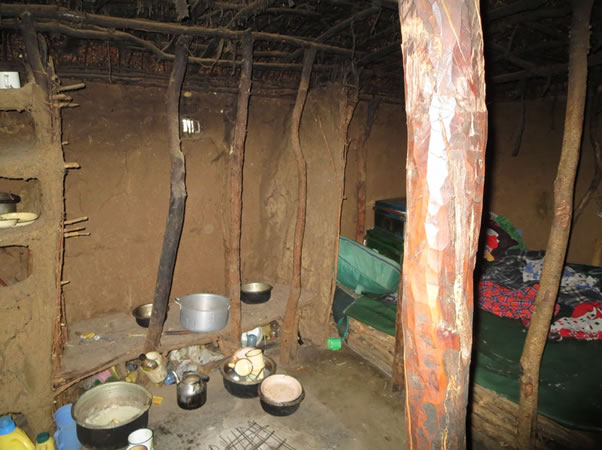January, 2020 Although he is materially poor, at his house was found a housefly cord. Sukuma (Tanzania) Proverb
 |
Ni ng’wa ng’habhi lugakowa luge lo ngi (Sukuma) Hata kwa maskini ulipatikana uzi wa inzi (Swahili) Bien qu’il est matériellement pauvre, on a trouvé un fil de mouche domestique dans sa maison (French). Although he is materially poor, at his house was found a housefly cord (English). |
Sukuma (Tanzania) Proverb
Background, Meaning and Everyday Use
The Sukuma Ethnic Group is the largest ethnic group (“8,130,000 increasing” according to the 2016 Ethnologue: Languages of the World) in Tanzania in East Africa and live mainly in rural areas in the northwestern part of the country on or near the southern shores of Lake Victoria – mainly in the Mwanza and Shinyanga Regions. Sukuma means “north” and refers to “people of the north.” They are relatives of the Nyamwezi Ethnic Group and share a similar language of Bantu origin. Traditionally part of an oral culture, the Sukuma people use many types of oral literature such as proverbs, sayings, riddles, stories, myths and songs to communicate values and priorities.
This is an inspiring proverb of the Sukuma people in Tanzania. Even poor people have simple means of killing unwanted houseflies such as insecticide-treated cords, strings, ropes, tendons, traps, baits, screen strips, etc. The proverb calls for respect and value of all people regardless of their social, economic or educational background. The proverb emphasizes that even a poor person has a value and a contribution to the society. Thus he/she should be equally given respect and encouraged to contribute to the society as any other member.
This proverb is similar to the song composed by Bhuhimila Hunda in 1965. Hunda in his song explains that once upon a time his traditional healer, who was regarded incapable by most society members, saved the life of one of the song leaders Manju who was terminally ill and without hope of recovering. The song leader Manju had his traditional healer whom he considered more capable and powerful than Hunda’s. However, after his traditional healer failed to save his life, Manju lost hope and was waiting for his death. Hunda convinced him to give a try and meet Hunda’s traditional healer who finally saved his life. Hunda’s song invites society members to give due value to any person in the society regardless of the social dimensions.
In a traditional Sukuma setting, a troubled person may visit a traditional healer (herbalist) for a solution. The solution to the trouble may require a supply and application of various materials (concoctions) the herbalist is short of. In that situation the troubled fellow is advised to search for the missing ingredient from any member of the society. It happens that in pursuit for the missing ingredient, the troubled fellow will have to inquire from friends, relatives and members of the society by directly talking to them face to face or through phones (recently) believing that the missing ingredient can be found with any member of the society regardless of his/her social status. Most often, scarce and compulsory ingredients were found with poor people whose social status was regarded low.
A similar African proverb from Haya in Tanzania states that a thing is valued least when we have it and valued most when is gone (kwechuza omunyi wakianda). This proverb encourages the society members to value each other all the time. Society members are reminded to consider every person important and valuable to the society and to individuals.
Biblical Parallels
This lesson parallels the Holy Scriptures in 2 Corinthians 4:7 that says that a person’s body carries with it a treasure installed in it by God for his Name’s sake to show that all this surpassing power in our bodies is God’s. We are created and endowed with different treasures which demonstrate our social differences. However none of us are devoid of a treasure from God, and this make us equal before our creator and our fellow humans.
Contemporary Use and Religious Application
Society members are reminded to consider every person important and valuable to the society and to individuals. Some applications and examples: Simple workers who bring bricks for the foundation of the house are necessary for the big, completed building. In Small Christian Communities (SCCs) in rural areas of Africa, a poor, illiterate Christian can explain the meaning of a Bible passage. The Catholic Church is not made up of only big cathedrals and large congregations in the big cities, but also of Catholics in SCCs in the local neighborhoods.
Values of equality, inclusiveness and fairness are found in our “2020 African Proverb Calendar” (https://www.afriprov.org/images/afriprov/calendar/2020/2020cal-final.pdf).
Father Charles Wilbert Bundu
St. Augustine University of Tanzania
P.O. Box 307
Mwanza Tanzania
Smartphone: +255-756-563890
Email: charlesbundu@gmail.com
Photograph provided by:
Elias Bushiri Elie
Nairobi, Kenya
Smartphone: +254-735-973276
+254-792-556909
Email: ebushiri@gmail.com
e.bushiri@yahoo.com
